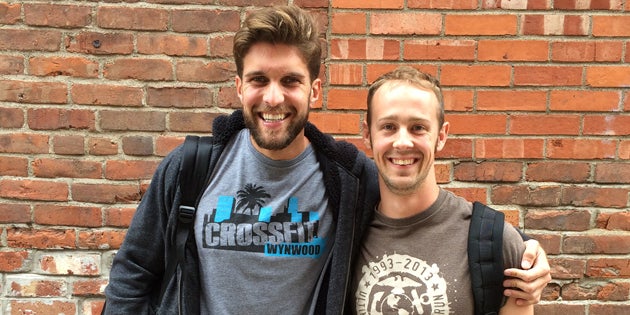Zachary Hanson ’10 and Diogo Duarte ’08 decided to put their College of Charleston degrees in political science and business administration, respectively, to use by launching a startup. In 2013, the two started work on the Fidelity Network, or FiNe, an app that allows businesses to reward customer loyalty with fluctuating discounts. The app eliminates the need to carry individual customer rewards cards and makes transactions with loyal customers more efficient by scanning their fine app to note a purchase, rather than punching a card.
After more than a year of trial and error, Hanson and Duarte offer a few do’s and don’ts for current students and recent alumni interested in launching their own startup:
Do: Take your time with your idea
As an undergraduate student at the College and then a law student at the Charleston School of Law, Duarte frequented Kudu Coffee (4 Vanderhorst St.). A professor asked him how he would improve the coffeehouse and Duarte spent years working out the answer to that question before realizing that his ideas and solutions applied across many industries, not just cafés and restaurants. Thus, FiNe was born.
Don’t: Be slow
Just because you’re taking your time developing an idea, that doesn’t mean you should move slowly when it comes to launching your business – keep in mind that if you’re seeing weaknesses in the market, someone else could also see them and act before you get the chance. Hanson and Duarte often start their days around 5 a.m. so they can pack each week with maximum productivity.
Do: Have a realistic one- and five-year plan
“We hope to exceed 50,000 users in Miami, Fla. and Columbia, MO within the next five years,” Hanson said. “We envision becoming the go-to loyalty rewards program for small business and hope to bolster the buy local, be local scene.”
Don’t: Be afraid to make adjustments to the plan as you go
“Throughout the first year of brainstorming FiNe, we had to constantly adjust and simplify our product. Even when we were close to launching our minimum viable product (MVP), we were constantly having to make concessions to get it to market,” Duarte explains. “Similar to how Twitter evolved over the years, our product now is very different from our idea at the beginning, and most likely it will continue to change as we evolve as a company.”
RELATED: Read advice from Arianna Megaro ’13 on how to launch a product one year after you graduate.
Do: Build relationships with potential investors
“You will never get funding if you don’t communicate with people in-person,” Hanson said. “You won’t always get an investment, but you will receive valuable advice, mentors, connections, friends, and even future employees. If you are able to set up a meeting with someone, be sure to send them an email thanking them for their time and feedback after the meeting.”
Don’t: Be closed-minded about meeting outcomes
If you contact a potential investor hoping simply for their money and nothing else, you will probably be disappointed.
“Do not email potential investors seeking monetary compensation immediately,” Hanson said. “Instead, genuinely ask them for advice on growing your startup. If they see you’re passionate about growing, regardless of funding, they are more likely to foster a relationship with you and your company.”
Do: Take advantage of opportunities in college
Duarte recommends taking an entrepreneurship course if you’re interested in launching a startup. “Gordon Dehler was the best professor for entrepreneurship. I always think of his management and organizational behavior course when I think of courses that motivated me to start my own business,” he said.
RELATED: Learn more about entrepreneurship courses in the School of Business.
Hanson found that studying abroad, which he and Duarte both did, helped form his perception of business innovation. “I was able to study abroad twice in both Moscow and Saint Petersburg, Russia, and Diogo studied in London and Paris. After we both graduated, Diogo and I both spent significant time working overseas. The cultural crash course of living around the world, making connections, and seeing how businesses work on a global scale was probably the most beneficial thing to our company,” he said.
Don’t: Be afraid to dream big
Hanson admits, “Our first year we were just kind of pretending we had a business and doing the grunt work to get it up-and-running.” Now, with the help of a very talented programmer, Hanson and Duarte expect to expand the Fidelity Network to small businesses in Charleston, S.C. and Birmingham, Ala. within the year.





